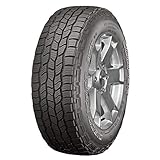10 Best All Season Suv Tires For Snow of February 2026
List of Top Rated All Season Suv Tires For Snow from thousands of customer reviews & feedback.
Updated On Feb 2026
1,083 Reviews Studied

- EXCEPTIONAL TRACTION: Asymmetric tread pattern with large lateral grooves delivers good traction and even wear
- LONG LASTING: Optimized tread compound technology providing exceptional tread wear and high mileage (UTQG: 6 A A)
- TRACTION IN SNOW & SLUSH: Large number of lateral sips delivers enhanced traction in snow and slush conditions
- 50,000 mile (W/Y speed rating) & 60,000 mile (H/V speed rating) tread wear
- CAUTION: Radar Tires recommends that you install the same size, load index, and speed rating as the stipulated O.E. fitment(s) or an acceptable alternative as specified by the vehicle manufacturer. We do not recommend installing standard tires as a replacement to your O.E. Run-Flat tires.
- Fit Type: Vehicle Specific
- Load Capacity: 1929.0 Pounds

- All-Season Highway Tire
- Mid-range highway tire for crossover vehicles, SUVs and pickup trucks
- All-Season performance
- Superior handling
- Comfortable ride
- Standard Limited Warranty
- Free 45-Day Test Drive
- Treadwear warranty: 60,000 miles

- Treadlife: N/A
- Season: All Season
- Performance: Mud Terrain
- Car Type: Light Truck
- Load Range E, 10-Ply Rated, 10-PR

- SILICA TECH adopted for better wet grip as well as low rolling resistance

- Cooper Tires 2020 Late Summer Tire Reward Purchase Requirements: New set of four (4) qualifying Cooper tires
- All-Terrain, All-Season / Severe Weather Tire
- Grips the surface, rocky or smooth, under the most severe weather, rain or shine
- On-road comfort with off-road durability
- Maximum grip and handling on wet roads
- Stops on average over 20 feet shorter on snow
- Severe weather rated
- Standard Limited Warranty
- Free 45 day test drive
- Treadwear warranty: 65,000 miles

- Light Truck, SUV & Crossover Tire
- Long wear life & great comfort
- Excellent wet & snow traction
- 70, 000 Mile Manufacturer's Treadwear Limited
- 60-days satisfaction & 3-year flat tire assistance
- Fit Type: Vehicle Specific

- Treadlife: N/A
- Season: All Season
- Performance: Mud Terrain
- Car Type: Light Truck
- Load Range C, 6-Ply Rated, 6-PR

- Spiral Wrap Improves High Speed Capability.
- Wide Straight Grooves Helps Channel Water For Improved Wet Traction.
- Rounded Casing Profile Provides A Smooth Ride.
- Solid Shoulder Ribs Helps Promote Lasting Wear.
- Notches In Grooves Aid Snow Traction.
- Fit type: Vehicle Specific
- Load capacity: 2469 pounds
- All-season tire for light trucks, crossovers, and SUVs
- Rounded casing profile for a smooth ride
- Great selection of fitments for sport utility vehicles
- Notches in grooves improve snow traction
- Outstanding wet weather traction and a quiet ride

- This product is not for sale in the state of Arkansas

- All-Season Highway Tire
- Mid-range highway tire for crossover vehicles, SUVs and pickup trucks
- All-Season performance
- Superior handling
- Comfortable ride
- Standard Limited Warranty
- Free 45-Day Test Drive
- Treadwear warranty: 60,000 miles
Guide to Consider All Season Suv Tires For Snow
Winter weather is unpredictable by nature. Some winters are milder than others, while some are more severe. The extremely low winter temperatures have a big impact on the roads themselves, causing them to freeze over. When combined with falling snow, heavy winds, and precipitation, this can result in dangerous conditions that are difficult to navigate. While it's important to outfit your vehicle with the best tires for snow, it's also important to ensure that they are still good tires for all seasons.
Things To Consider For Buying All Season Suv Tires For Snow
Even if drivers have the best possible tires for snow, winter driving can still pose a serious challenge. All-season tires are the most common type, but snow tires will provide you with a better grip in icy conditions. They are particularly useful if you live somewhere that experiences frequent subzero temperatures, which can damage your vehicle's rubber.
Compactibility
Some drivers choose to go with all-season tires because they don't want to replace them twice a year. However, To get all-season tires specially designed for winter weather are engineered to perform better in the cold than your average set of summer or all-season tires. Like the Tires For SUV All Seasons, they also have more aggressive tread blocks, improving traction on ice and compacted snow.
Weather Conditions
To drive on snow and ice-covered roads most of the time, for example, if you live in a country like Canada, Snow tires are your best choice. The rubber compound composes a snow tire's tread is ideal for freezing temperatures. Similar to All-Season Tires For Snow And Ice, they're also more effective when it comes to grip on slippery surfaces.
Traction Control
They have a deeper side depth, which helps provide biting edges for traction.
Since more rubber is on their tread blocks, Light truck Snow Tires have improved traction than summer and all-season tires. It's a good idea not to make this compromise. Your safety could be put at risk due to decreased traction if you do.
Limitations
All-season tires for snow compromise the grip and traction of summer and winter tires. All-season snow tires have deeper treads than standard all-weather tires, which means they can perform better in wet conditions. However, you should note that snow tires will not give you a good grip in dry conditions as all-season tires.
Conclusion
While it might be tempting to go with all-season tires for snow, if you live somewhere with snow, tires are better when it comes to grip in low-temperature conditions. This is because they have more rubber on their tread blocks, making it easier to grip slippery surfaces due to rain or ice.



